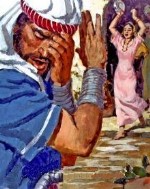 士师记第五课:耶弗他士师:士师记第十章至第十一章
士师记第五课:耶弗他士师:士师记第十章至第十一章
一。士师记10章:
1-5节:另外两位士师:陀拉和睚珥。
6-18节:请写下以色列人如何再次违背耶和华。
第6节开始:第五位伟大的士师:耶弗他:
6-18节:此经文如何描述士师记里面,我们时常见到的历史规律和循环?
15节:“以色列人对耶和华说:”我们犯罪了,任凭你___ ___待我们吧!只求你今日___ ___我们”。
18节:“基列的民和众首领彼此商议说:‘谁能先去攻打亚扪人,谁必作基列一切居民的___ ___’”。因为此句话,此诺言,耶弗他就出现。
二。士师记11章:耶弗他:
1-11节:耶弗他的兄弟为什么把耶弗他赶出去?之后他们为什么请他回来?请他回来做什么?
10-11节:“耶弗他在米斯巴将自己的一切话,陈明在耶和华面前”。您认为耶弗他这样做,诚实不诚实?
12-27节:耶弗他向亚扪人的王温习他们两个民族的哪段历史?
27-29节:历史课的结论:“原来我没有得罪你,你却攻打我,恶待我。愿审判人的耶和华,今日在以色列人和亚扪人中间判断是非”。亚扪人的王置之不理耶弗他的话,所以神感动耶弗他去___击亚扪人。
30-40节:耶弗他许愿:
30-31节:耶弗他向神许了什么愿?“耶弗他就向耶和华许愿说:‘你若将亚扪人交在我手中,我从亚扪人那里平___ ___安回来的时候,无论什么人,先从我家门出来迎接我,就必___ ___,我也必将他___ ___为燔祭”。此句话是鲁莽的话还是虔诚的话呢?历史上,解经家对耶弗他向耶和华许愿有两个不同的看法。1)拘泥于字面上的意思 (literal):耶弗他真的把女儿摆在祭坛上杀了,献给耶和华神。2)象征式的 (symbolic or figurative):父亲不让女儿结婚。父亲为女儿许愿说,他一生当中不要结婚,只要在神的面前侍奉神。这两个解释,哪个说法对?(不知道。)神从来没有要求任何人许愿献上人给神。(神不让亚伯拉罕献上以撒给他为祭。)相反地,异教徒把人摆在祭坛上杀掉献给偶像的这种行为,神非常讨厌。但是,士师记的作者好像不反对耶弗他所许的愿和他的行为。在第37-38节,女儿“哀哭”,是因为他不会结婚,而不是因为他将要丧命。但是,第31节“番祭”二字,看起来好像她真的会死的意思。不少解经家认为此经节就是这个意思。事实上,多年,一般《圣经》学者说耶弗他真的把女儿摆在祭坛上杀了;这就是传统的解释。对现代人来说,此事是不可思议的。(注意:《圣经》的特点之一是它不隐藏伟人、英雄、领袖的罪。)跟耶弗他及他所许的愿有关,请参看:希伯来书11:32;民数记30:2;申命记23:21-23;传道书5:4-5。
第十一节,耶弗他去米斯巴敬拜神:“耶弗他诚实不诚实”这个问题,怎么样帮助我们理解他为什么许此愿,并且他到底许了什么样的愿?
对耶弗他和他女儿,以上的两个解释,哪个说法对?女儿丧了命呢?还是女儿要侍奉神一辈子?您认为呢?
三。士师记12章:耶弗他的结局:
1-7节:为什么基列人与以法莲人要争战?基列人用什么方法辨别基列人和以法莲人?耶弗他作以色列的士师几年?
四。士师记12:8-15节:请列出其他三位士师:以比___,以___,押___。
读者:欢迎您把这篇短文下载,复印,用在您的《圣经》班里。
Judges/05: Jephthah
Judges Chapters Ten and Eleven
1. Joshua 10: Vs. 1-5: Two more judges: Tola and Jair:
Vs. 6-18: Write down how the Israelites once again disobeyed and forsook Jehovah.
Beginning in vs. 6: The Fifth Great Judge: Jephthah:
Vs. 6-18: How does this Scripture describe the recurring pattern of history that we see continually in the book of Judges?
V. 15: “But the Israelites said to the LORD, “We have sinned. Do with us whatever you think b___, but please r___ us now.”
V. 18: “The leaders of the people of Gilead said to each other, “Whoever will launch the attack against the Ammonites will be the h___ of all those living in Gilead.” We meet Jephthah because of this promise.
2. Judges 11: Jephthah:
Vs. 1-11: Why did Jephthah’s brothers drive him away? Why did they ask him to return later on and what did they ask him to do?
Vs. 10-11: “And he repeated all his words before the LORD in Mizpah.” Do you think Jephthah was sincere in so-doing?
Vs. 12-27: What bit of history of the two peoples did Jephthah review with the Ammonite king?
27-29: Result of the history lesson: “I have not wronged you, but you are doing me wrong by waging war against me. Let the LORD, the Judge, decide the dispute this day between the Israelites and the Ammonites.” The king of Ammon paid no attention to what Jephthah said, so God moved Jephthah to a___k the Ammonites.
Vs. 30-40: Jephthah’s vow:
Vs. 30-31: What vow to God did Jephthah make? “And Jephthah made a vow to the LORD: “If you give the Ammonites into my hands,31 whatever comes out of the door of my house to meet me when I return in t___ [Chinese Union Version says “in peace”] from the Ammonites will be the LORD’S [Union Version says “be given or dedicated to the LORD”], and I will s___ it as a burnt offering.” Is this a rash statement or a statement of piety? Historically, Biblical scholars have interpreted Jephthah’s vow to God in two different ways: 1) Literally: Jephthah actually placed his daughter on the altar and killed her as a sacrifice to the Lord God. 2) Symbolic or Figurative: Jephthah did not allow his daughter to marry, rather he vow ed on her behalf that she would never marry; she would serve God in God’s presence all of her life. Which of these two explanations is correct? (We do not know.) God has never asked people to vow to sacrifice humans to God. (God did not allow Abraham to sacrifice Isaac.) In fact, the human sacrifice of the non-Jewish religions was completely repugnant to God. However, the writer of Judges does not seem to have opposed what Jephthah did in making his vow. In vs. 37-38, Jephthah’s daughter “wept” because she would never marry, not because she was about to loose her life. However, the two words “burnt offering” in vs. 31 seem to indicate that she would actually be killed. Many Biblical scholars favor this interpretation; indeed this has been the traditional interpretation, difficult though it is for modern man to understand. (Note: One thing that makes the Bible a special book is that it does not hide the sins of heroes and leaders.) Other Scriptures that have some relation to Jephthah and his vow: Hebrews 11:32; Numbers 30:2; Deuteronomy 23:21-23; Ecclesiastes 5:4-5. How might whether or not Jephthah was sincere in his worship at Mizpah in verse 11 help us understand what his vow was and why he made it? What is your opinion about Jephthah and his daughter; which interpretation is correct? Did the daughter loose her life or did she serve God all her life?
3. Judges 12: Jephthah’s Demise:
Why did the Gileadites and the Ephraimites fight? How did the Gileadites distinguish between Gileadites and the Ephraimites? How many years did Jephthah judge Israel?
4. Judges 12:8-15: List three other judges: I___, E___ and A___
圣经问答
士师记第四课:耶弗他士师:士师记第十章至第十一章
Bible Study Questions: Judges/05: Jephthah
Judges 10-11
作者:谢德华 ©By Edward Short
本文所问的问题使用汉子圣经。
欢迎您把此文下载用在圣经班或私人学习。
A series of Bible lessons, written in Chinese
and based largely on the text of the Chinese Bible.
You may download and print copies of this lesson
for use in your Bible class.
